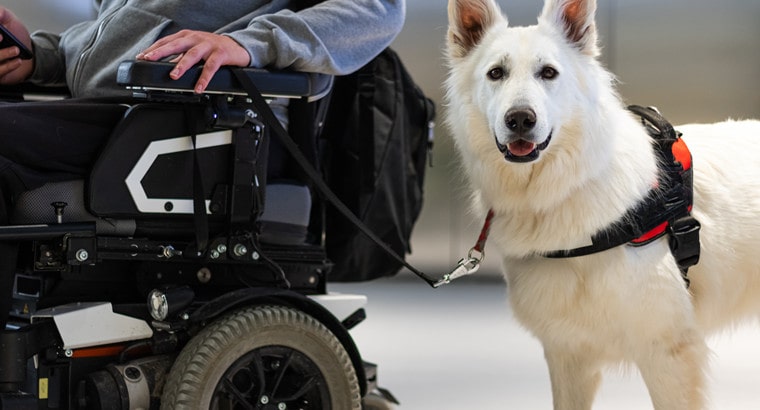Pomeranians are easily recognizable for their fluffy appearance and happy expressions, and they are often seen playing and spending time with their owners. This breed may be on the small side, but that doesn’t prevent them from completing certain service dog tasks.
Pomeranians may be incredibly helpful for certain individuals, and they can be trained to act as certain types of service dogs. Our article gives you more information on how service dogs are helpful and the service dog tasks that Pomeranians may be adept at completing.
What Are Service Dogs?
Service dogs are defined by the Americans with Disabilities Act (ADA) as a dog that performs specific tasks or duties to help relieve symptoms of a disability or support an individual through certain aspects of their disability.
Service dogs are trained to perform specific tasks that are related to an individual’s need, such as guiding the visually impaired, alerting their owners to medical issues such as the onset of seizures, or interrupting their owner’s harmful behaviors.
There are three main types of service dogs – psychiatric service dogs, medical service dogs, and mobility or guide service dogs. Each of these working pups is trained to complete specific disability-related tasks, and they may learn more specialized skills based on what an individual needs.
Pomeranian Breed Traits
Even though a Pomeranian is not what many people think of when they think of service dogs, this small breed can be incredibly helpful in certain service dog situations.
Pomeranians are known for being inquisitive, active, playful, and easily trained. Many individuals adopt Pomeranians due to the easy companionship they provide, and this pup does love to be the center of their family’s attention.
Pomeranians need a fair amount of mental stimulation, and service dog training or tasks help ensure they stay healthy and happy.
Do Pomeranians Make Good Service Dogs?
Due to their size, Pomeranians are not a good option for service dog tasks such as guiding the visually impaired or assisting those with mobility-related disabilities. However, they are easily trained, loyal to their owners, and make expert service dogs for those with hearing impairments, medical disabilities, or mental health conditions.
Pomeranians can be trained to detect blood sugar levels, blood pressure drops, and the onset of conditions like seizures and irregular heart patterns. They may be trained to alert their owners to medical problems before major issues occur. Along with this, they can prompt their owners to take medication or find a safe space to deal with the symptoms of their disability.
Pomeranians are also able to bring medication and water to their owners in addition to bringing small items like phones or remotes.
For the hearing impaired, Pomeranians are able to alert their owners when there are individuals at the door, as this breed has a long history of acting as a guard dog. They have keen hearing and are easily trained to help their owner open and close doors, retrieve items, and open or close cabinets.
Pomeranians might also be helpful to those with psychiatric disabilities, as they are small enough to accompany their owner virtually anywhere and provide support. They may also check rooms or homes for their owners, guard their owner’s backs, and redirect harmful or destructive behaviors. Pomeranians can be trained to remind their owners to take medication and they can lead others to their owner in emergency situations.
Of course, these aren’t the only tasks that a Pomeranian service dog can perform. You will often be able to train tasks helpful to your specific disability with your service dog, broadening their service dog skillset.
Can Pomeranians Be Emotional Support Animals?
Different from service dogs, emotional support animals are not trained to complete specific tasks that help with aspects of an individual’s disability. Instead, emotional support animals (ESAs) assist their owners by providing comfort and support with their presence.
Because of this difference, ESAs are not considered service dogs by the Americans with Disabilities Act, and they don’t have the same public access rights.
Pomeranians may easily be emotional support animals, as they often provide their owners with plenty of joy and comfort just by simply being in their lives.
If you wish to have your Pomeranian categorized as an ESA to benefit from Fair Housing Act rights, you will need to speak to your therapist, doctor, or another licensed medical provider. If you have a relevant diagnosis, they’ll provide a letter explaining your ESA needs.
Adding a Pomeranian Service Dog to Your Life
If you believe that you would benefit from a Pomeranian service dog, your first step is to speak with your medical provider about adding a service dog to your care plan. Once it’s determined that you will be able to add in a service dog and care for them adequately, you can work on adopting a trained Pomeranian service dog or training a Pomeranian that is already in your life.
Over time, the bond between you and your Pomeranian service dog will strengthen. From there, you can benefit from increased confidence, relief from certain disability symptoms, and companionship from your amazing working pup.










